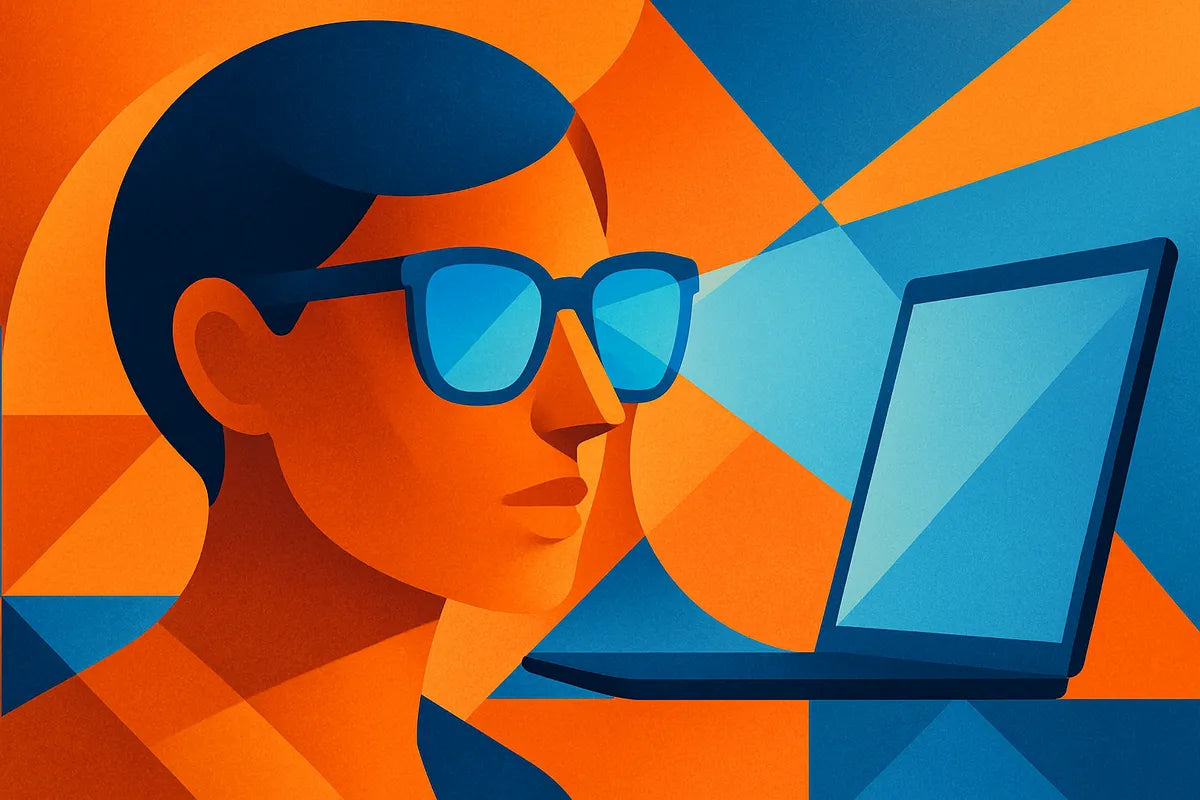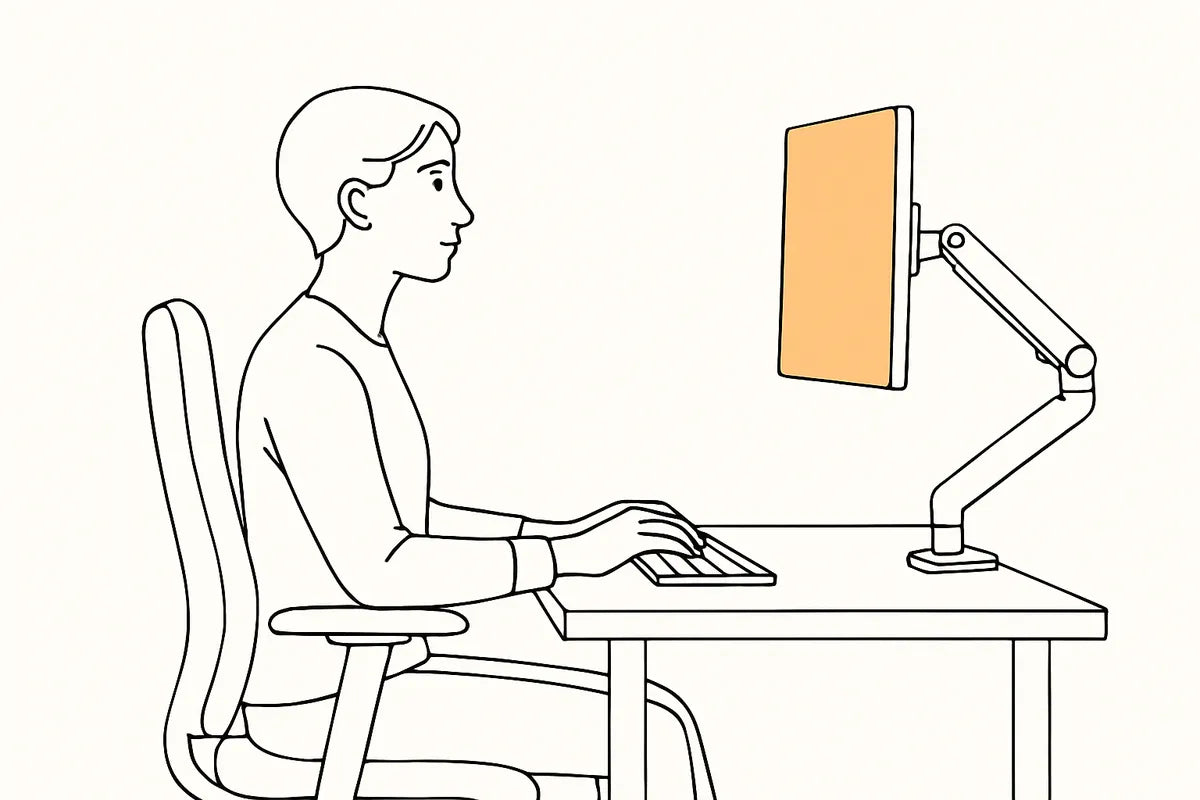Blue Light Glasses for Computer Use: Do They Really Help Your Eyes?
Most of us spend hours in front of screens every day. Computers, phones, and tablets have become part of our work and leisure, but all that screen time can take a toll on our eyes. Many people now use blue light glasses to reduce eye strain and improve comfort. But do they really work? This article explores how blue light glasses function, their benefits, and what to look for when buying them. We'll also examine their role in eye strain prevention, sleep disruption, and overall eye health. Whether you need computer glasses for work or gaming glasses for long sessions, understanding lens technology and protective eyewear features will help you make the right choice.
What Are Blue Light Glasses and How Do They Work?

Understanding Blue Light and Its Effects on Screen Time
Blue light is a high-energy visible light emitted by digital screens, LED lights, and even sunlight. It's not inherently harmful, but prolonged exposure from screens can cause discomfort known as digital eye strain. Because so many people spend hours on computers, eyeglasses for computer use have become essential for maintaining visual comfort during long workdays.
How Blue Light Blocking Lenses Function
Blue light glasses use light filtering and advanced lens technology to block or absorb a portion of blue light before it reaches your eyes. Some models feature clear lenses that filter only the most intense wavelengths, while others have a slight tint for higher protection. The goal is to reduce glare and screen reflection that contribute to fatigue and eye strain prevention. Many of these glasses also include an anti-reflective coating to enhance clarity and reduce distracting reflections during computer use.
Protective Eyewear Beyond Blue Light
Quality computer glasses often include UV protection as well. This feature helps guard your eyes from ultraviolet rays that can contribute to long-term damage. Whether you choose non-prescription glasses or prescription options, investing in protective eyewear designed for screen use helps reduce stress on your eyes during extended screen time. These glasses are not only useful for office work but also for gaming, where visual comfort and focus are critical.
Do Blue Light Glasses Really Help with Computer Eye Strain?

Understanding Digital Eye Strain
Digital eye strain, also known as computer vision syndrome, describes the discomfort that comes from staring at screens for long periods. Symptoms include blurry vision, headaches, and dry eyes. When you focus on a screen, your blinking rate decreases, causing your eyes to dry out faster. Blue light glasses can ease some of these effects by improving visual comfort and reducing glare. These benefits make them a popular choice for both office workers and gamers who experience long hours of screen exposure.
Scientific Research on Blue Light Blocking
Some studies show that blue light blocking lenses can reduce symptoms of eye fatigue. However, experts note that not all discomfort comes from blue light itself - factors like screen brightness, posture, and viewing distance also play a role. Using computer glasses should be part of a broader strategy for eye strain prevention, including proper lighting and regular screen breaks. Even if the relief is partly due to reduced glare from anti-reflective coating, many users report noticeable improvements in comfort during long sessions.
Practical Benefits During Daily Use
For everyday screen protection, blue light glasses can make a real difference. They reduce reflections, soften harsh screen brightness, and enhance contrast. Whether you’re editing photos, writing reports, or playing games, these small improvements help prevent fatigue. Combined with the 20-20-20 rule (looking 20 feet away every 20 minutes for 20 seconds), blue light glasses can be a practical tool for maintaining eye health during heavy computer use.
What Features Should I Look for in Blue Light Glasses?

Lens Technology and Light Filtering Quality
When shopping for eyeglasses for computer use, pay close attention to lens technology. High-quality lenses should offer balanced light filtering without distorting colors. Clear lenses are ideal for daytime use and office environments where accurate color perception matters. Some models include coatings that selectively filter blue light while maintaining a natural view of your screen. This balance ensures both protection and comfort throughout your workday.
Anti-Reflective Coating for Screen Protection
An anti-reflective coating is one of the most important features in computer glasses. It minimizes glare from artificial lighting and screens, improving clarity and reducing visual noise. This feature also helps during video calls or presentations by making your eyes more visible on camera. For gamers, anti-reflective coatings reduce reflections that can distract during fast-paced scenes, improving focus and overall gaming performance.
Comfort, Fit, and Prescription Options
Comfortable frames are as important as lens quality. Lightweight designs with flexible materials reduce pressure on the nose and temples during extended wear. Many brands offer both non-prescription glasses and prescription options, so you can combine corrective vision with blue light protection. If you already wear glasses, you can also find clip-on versions or special coatings applied to your existing lenses for added convenience.
Extra Features: UV Protection and Durability
For full protective eyewear, consider models that include UV protection to guard against harmful rays from indoor lighting and sunlight exposure through windows. Scratch-resistant coatings and durable materials will ensure that your glasses last longer, even with daily use. Some advanced lenses also have hydrophobic coatings that repel dust and smudges, keeping your vision clear with minimal maintenance.
How Does Blue Light Affect Sleep and Eye Health?
Blue Light and Sleep Disruption
Exposure to blue light in the evening can interfere with your body’s natural sleep cycle. Blue wavelengths suppress melatonin production, the hormone responsible for regulating sleep. That’s why scrolling through your phone late at night can make it harder to fall asleep. Blue light glasses can help by filtering these wavelengths, especially if you use screens before bedtime. Some people choose glasses with stronger blue light blocking for nighttime use to reduce sleep disruption and improve rest quality.
Long-Term Eye Health Considerations
Although research is ongoing, some experts suggest that excessive exposure to high-energy visible light might contribute to retinal stress over time. While the degree of risk is still debated, taking precautions through screen protection and balanced light exposure is wise. Regular eye exams and proper lighting conditions complement the use of blue light glasses for overall eye health maintenance.
Daytime Use for Visual Comfort
During the day, blue light glasses can reduce glare from computer screens and office lighting, improving visual comfort and concentration. For people working long hours in front of monitors, this can translate into better productivity and fewer headaches. Choosing glasses optimized for daytime use helps maintain natural color balance while still filtering enough blue light to ease strain.
Are There Different Types of Blue Light Glasses?
Computer Glasses for Work
Computer glasses are designed for mid-range vision - the distance between your eyes and your monitor. These glasses often feature clear lenses with mild blue light filtering and anti-reflective coating to enhance comfort during office hours. They’re ideal for professional environments where accurate color and sharp focus are essential for productivity.
Gaming Glasses for Extended Screen Time
Gaming glasses are tailored for high-intensity visual tasks. They typically include slightly tinted lenses that block a higher percentage of blue light and provide extra screen protection. The tint also enhances contrast, which can improve reaction times and reduce fatigue during long gaming sessions. With added UV protection and lightweight frames, gaming glasses combine performance and comfort for both casual and competitive players.
Non-Prescription Glasses and Prescription Options
Blue light glasses come in both non-prescription and prescription options, allowing anyone to benefit from them. Non-prescription glasses are perfect for people with normal vision who want screen protection. Prescription versions integrate corrective lenses with blue light blocking technology, offering a single solution for vision correction and eye strain prevention. Some brands even provide customizable lens coatings for specific needs like office lighting or outdoor use.
Specialized Glasses for Daytime and Nighttime Use
Some people use different glasses for different times of day. Daytime models focus on clarity and comfort, often with clear lenses that maintain natural colors. Nighttime versions block more blue light to minimize sleep disruption. This combination allows users to protect their eyes around the clock while preserving healthy sleep patterns.
Practical Tips for Reducing Digital Eye Strain
Combine Blue Light Glasses with Healthy Habits
While blue light glasses can help, they work best alongside good screen habits. Follow the 20-20-20 rule, ensure proper screen height, and adjust brightness to match your surroundings. Using artificial tears or a humidifier can also help reduce dry eyes caused by extended screen time. According to Cleveland Clinic experts, taking regular breaks and blinking often are just as vital for eye strain prevention as using specialized eyewear.
Adjusting Your Work Environment
Set up an ergonomic workspace that supports eye health. Reduce glare by positioning your monitor away from direct light sources. Consider using screen filters or adjusting your monitor’s color temperature to warmer tones in the evening. Pairing these adjustments with blue light glasses enhances visual comfort and reduces cumulative stress on your eyes.
Choosing the Right Pair for You
Understanding Your Screen Habits
Think about how and when you use screens. If you spend most of your day working on a computer, opt for clear-lens computer glasses designed for daytime use. For late-night gaming or reading, select lenses with stronger blue light filtering to reduce sleep disruption. Your choice should match your daily routine and screen exposure levels.
Balancing Cost and Quality
Not all blue light glasses are made equal. While inexpensive models can provide basic protection, investing in higher-quality lenses with proper coatings ensures better results. Reputable brands often publish data on their blue light blocking percentages and lens technology. Look for those with transparent specifications and reliable customer reviews.
Where to Learn More
For more insight into blue light and eye health, you can review resources from scientific studies on light exposure and visual comfort. Consulting an optometrist is also wise if you experience persistent discomfort or vision changes, as they can recommend prescription options tailored to your needs.
Final Thoughts on Blue Light Glasses and Eye Health
Blue light glasses for computer use can offer real benefits, especially for people who spend long hours in front of screens. They help with eye strain prevention, reduce glare, and may improve sleep quality by limiting exposure to blue wavelengths. Whether you choose gaming glasses, computer glasses, or simple non-prescription glasses, the key is selecting a pair with the right lens technology, anti-reflective coating, and UV protection. Combined with healthy screen habits and regular eye check-ups, blue light glasses can play a valuable role in maintaining comfort and eye health in our screen-focused world.




